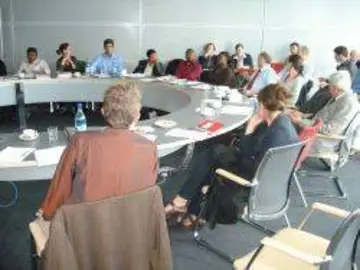Second ZEF-GTZ Workshop "Science for Development" - Topic: Water
June 24, 2009.
How can GTZ projects benefit from scientific outcome? How can the collaboration between the ZEF and the GTZ (German Technical Cooperation) be further improved?
These were the main questions discussed by 30 scientists and experts during the second ZEF-GTZ workshop "Science for Development" in Eschborn, held on 28 May 2009. This workshop focused on the issue of water.
The GTZ sectoral project on Higher Education has been supporting the "Bonn Interdisciplinary Graduate School for Development Research" of ZEF on behalf of the BMZ since 2000. More than 110 doctoral research projects have been supported by these funds. The idea is now to re-channel some selected PhD research back to GTZ activities. In addition, 80 per cent of ZEFs PhD students have returned into their home countries, thus passing on their knowledge gained from their scientific work in Germany.
Three PhD students of ZEF presented their scientific work: Neeraj Mishra (India), Julia, Roswitha Kloos (Germany), and Eleni Ayalew Belay (Ethiopia).
Neeraj Mishra reported on his analysis of a visit of German parliamentarians to the "Indo-German Watershed Development Project" (IGWDP) in 2006. His main questions were: How will foreign policy-makers who are influenced by completely different socio-cultural factors judge the work of their native project partners? Which statements will they make when being able to closely observe the activities of the participants in their country of origin? Will vice versa the native participants be able to understand their statements?
Neeraj Mishra emphasized the necessity of involving the state level in the projects such as the "Indo-German Watershed Development Project" to a larger extent, since non-governmental groups often have limited management capacities and follow their own agenda.
South Africa is one of the countries acutely threatened by water shortage. Growing demand for water and the increasing competition between industry, agriculture, and domestic households form an increasing problem.
Julia Roswitha Kloos and Teresa Linz are investigating how water use could be optimized in a South African pilot region, the Middle Olifants Sub-Basin. The concept of Integrated Water Resource Management has to be based on detailed information and knowledge of efficient water use, taking economic factors into consideration. The results of their research so far show, that e.g. the water prices have only little impact on the water consumption used for agriculture, especially for growing maize and citrus fruits. But they have a crucial impact on industrial water use.
<image style="margin-right: 10px" src="http://www.zef.de/fileadmin/webfiles/downloads/press/Pic2_180.jpg" align="left">Eleni Belay from Ethiopia depicted in the third presentation the dramatic problems caused by the constantly expanding lake Beseka in Ethiopia, which has had severe implications for the surrounding environment. Several important traffic and trade routes, such as a railroad and a freeway, have been flooded, for example. This forced nomadic people who occasionally settled on the former banks of the lake to flee into the neighboring Awash National Parks. In her scientific study Eleni Belay explored the water and groundwater dynamics in the watershed of the lake and was able to assess the factors causing the huge water inflow.
The discussion after the presentations underlined the importance of improving the collaboration between research and development projects further. With its scientific studies ZEF would like to see an increase of political decisions based on scientific research.
Many ZEF PhD theses include recommendations for political decisions to be made in the countries in question. Hereby the challenge for the ZEF PhD students consists in creating understandable statements which can be easily translated into practice by the responsible decision makers. For that reason it is not just important to contact the decision makers of the different countries right at the beginning of the scientific research project, but also to ask for the support of recognized experts with practical experience. The GTZ volunteers to support ZEF’s PhD students in these activities and also in choosing adequate themes for their PhD theses.
The next GTZ-GTZ workshop is due to take place in November 2009 and will focus on the topic of land use systems.


